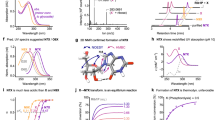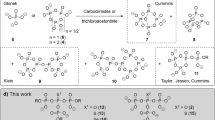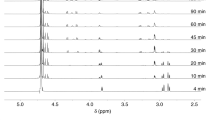Abstract
THE new sensitive methods of recognizing amino-acids (for example, paper chromatography) make it necessary to re-examine the degradation products appearing after hydrolysis of non-protein substances containing nitrogen in biological material under investigation. It is, for example, important to know whether significant amounts of amino-acids can occur in hydrolysates of purines and pyrimidines, and obscure the results of amino-acid analysis of nucleoproteins.
This is a preview of subscription content, access via your institution
Access options
Subscribe to this journal
Receive 51 print issues and online access
$199.00 per year
only $3.90 per issue
Buy this article
- Purchase on Springer Link
- Instant access to full article PDF
Prices may be subject to local taxes which are calculated during checkout
Similar content being viewed by others
References
Kossel, A., Hoppe-Seyl. Z., 12, 271 (1888).
Krüger, M., Hoppe-Seyl. Z., 16, 160 (1892).
Stevens, C. D., J. Biol. Chem., 120, 751 (1937).
Smith, J. D., and Markham, R., Biochem. J., 46, 509 (1950).
Author information
Authors and Affiliations
Rights and permissions
About this article
Cite this article
FRICK, G. Formation of Amino-Acids in Hydrolysis of Adenine. Nature 169, 758–759 (1952). https://doi.org/10.1038/169758a0
Issue Date:
DOI: https://doi.org/10.1038/169758a0
This article is cited by
Comments
By submitting a comment you agree to abide by our Terms and Community Guidelines. If you find something abusive or that does not comply with our terms or guidelines please flag it as inappropriate.



